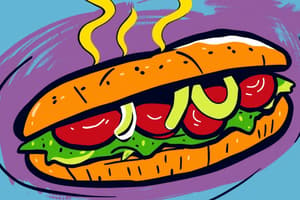Podcast
Questions and Answers
What is the primary hazard associated with handling hot liquids?
What is the primary hazard associated with handling hot liquids?
- Burns and Scalds (correct)
- Manual Handling
- Slips, Trips, and Falls
- Cuts and Lacerations
Which piece of equipment is specifically designed for preparing hot beverages?
Which piece of equipment is specifically designed for preparing hot beverages?
- Soup Caldrons
- Water Boilers (correct)
- Brat Pans
- Fryers
What document should be consulted for safe operating procedures specific to a particular piece of equipment?
What document should be consulted for safe operating procedures specific to a particular piece of equipment?
- SOP 3
- Manufacturer's Instructions (correct)
- Health and Safety Regulations
- Manager's Instructions
Why is it crucial to consult manufacturer's instructions when handling hot liquids?
Why is it crucial to consult manufacturer's instructions when handling hot liquids?
Besides manufacturer's instructions, where else can you find guidance for safe handling of hot liquids?
Besides manufacturer's instructions, where else can you find guidance for safe handling of hot liquids?
What is the significance of 'Manual Handling' as a hazard associated with handling hot liquids?
What is the significance of 'Manual Handling' as a hazard associated with handling hot liquids?
Why is it crucial to follow this Safe Operating Procedure (SOP) strictly?
Why is it crucial to follow this Safe Operating Procedure (SOP) strictly?
Which of these tasks would be considered manual handling, as described in the document?
Which of these tasks would be considered manual handling, as described in the document?
Which of these pieces of equipment is NOT used for preparing hot beverages?
Which of these pieces of equipment is NOT used for preparing hot beverages?
In which of these contexts is the use of a trolley likely to be a manual handling task related to hot beverages?
In which of these contexts is the use of a trolley likely to be a manual handling task related to hot beverages?
What is the main purpose of a "bulk brew" machine in hot beverage preparation?
What is the main purpose of a "bulk brew" machine in hot beverage preparation?
What type of equipment is a "bain marie" considered, in the context of preparing hot beverages?
What type of equipment is a "bain marie" considered, in the context of preparing hot beverages?
Which of these is NOT a characteristic of manual dishwashing equipment outlined in the document?
Which of these is NOT a characteristic of manual dishwashing equipment outlined in the document?
Based on the provided list, what is a possible reason for separately listing "café sets" as hot beverage equipment?
Based on the provided list, what is a possible reason for separately listing "café sets" as hot beverage equipment?
What is the main difference between a "pour & serve" coffee machine and a "black & white" coffee machine?
What is the main difference between a "pour & serve" coffee machine and a "black & white" coffee machine?
If the document section is a general safety guide for a food service setting, what does the inclusion of "hot trolleys" suggest about the potential manual handling risks?
If the document section is a general safety guide for a food service setting, what does the inclusion of "hot trolleys" suggest about the potential manual handling risks?
When lifting a pan requiring two hands, what is the correct procedure?
When lifting a pan requiring two hands, what is the correct procedure?
When handling hot cooking equipment, what is the forbidden practice?
When handling hot cooking equipment, what is the forbidden practice?
What is the maximum permissible temperature for soup during service?
What is the maximum permissible temperature for soup during service?
What is the recommended approach for preparing hot beverages?
What is the recommended approach for preparing hot beverages?
What is the importance of maintaining cleanliness and integrity of oven mitts?
What is the importance of maintaining cleanliness and integrity of oven mitts?
What is the primary purpose of a rubber apron in this context?
What is the primary purpose of a rubber apron in this context?
What is the appropriate material for handling hot pots and pans?
What is the appropriate material for handling hot pots and pans?
What are the critical aspects to consider when handling hot equipment?
What are the critical aspects to consider when handling hot equipment?
Why does the content prohibit using a tea towel to handle hot equipment?
Why does the content prohibit using a tea towel to handle hot equipment?
Flashcards
Handling hot liquids - Hazards
Handling hot liquids - Hazards
Hot liquids, like those found in fryers, brat pans, water boilers, and soup caldrons, can cause burns and scalds if not handled correctly.
Handling hot liquids - Hazards
Handling hot liquids - Hazards
Spilled hot liquids can create a slippery surface, leading to slips, trips, and falls.
Handling hot liquids - Hazards
Handling hot liquids - Hazards
Lifting and carrying heavy containers of hot liquids can cause strain and injury.
Handling hot liquids - Hazards
Handling hot liquids - Hazards
Signup and view all the flashcards
Handling hot liquids - Equipment Variations
Handling hot liquids - Equipment Variations
Signup and view all the flashcards
Handling hot liquids - Manufacturer Instructions
Handling hot liquids - Manufacturer Instructions
Signup and view all the flashcards
Handling hot liquids - Seeking guidance
Handling hot liquids - Seeking guidance
Signup and view all the flashcards
Goggles: Follow Instructions
Goggles: Follow Instructions
Signup and view all the flashcards
Two Cloth Rule
Two Cloth Rule
Signup and view all the flashcards
Soup Serving Temperature
Soup Serving Temperature
Signup and view all the flashcards
Rubber Apron
Rubber Apron
Signup and view all the flashcards
Prohibited Materials for Hot Items
Prohibited Materials for Hot Items
Signup and view all the flashcards
Oven Mitts Conditions
Oven Mitts Conditions
Signup and view all the flashcards
Moving Hot Items
Moving Hot Items
Signup and view all the flashcards
Handling Hot Equipment
Handling Hot Equipment
Signup and view all the flashcards
Avoid Wet or Dirty Oven Mitts
Avoid Wet or Dirty Oven Mitts
Signup and view all the flashcards
What are automated food processing machines?
What are automated food processing machines?
Signup and view all the flashcards
What are the different types of automated food processing machines?
What are the different types of automated food processing machines?
Signup and view all the flashcards
What is included in "mechanical cleaning equipment"?
What is included in "mechanical cleaning equipment"?
Signup and view all the flashcards
What does "working at height" refer to in the context of kitchen safety?
What does "working at height" refer to in the context of kitchen safety?
Signup and view all the flashcards
What is the purpose of "using cold store"?
What is the purpose of "using cold store"?
Signup and view all the flashcards
What are "Safe Operating Procedures (SOPs)"?
What are "Safe Operating Procedures (SOPs)"?
Signup and view all the flashcards
What are "site specific control measures"?
What are "site specific control measures"?
Signup and view all the flashcards
What differentiates "additional site specific control measures" from standard SOPs?
What differentiates "additional site specific control measures" from standard SOPs?
Signup and view all the flashcards
Study Notes
BENUGO Risk Assessments and Safe Operating Procedures 2025
- Document reference: SOP & RA Master
- Control number: TRC
- Version: 5
- Review date: 31/12/2024
- Produced date: 01/01/2025
- Document created for health and safety procedures
Introduction
- Business has a legal duty to protect staff and customers
- Food industry is a potentially hazardous environment with risks of burns, cuts, slips, and trips
- Risk assessments are created to identify these risks
- Control measures are detailed safe operating procedures (SOPs)
- For businesses employing five or more people, risk assessments should be documented.
Risk Assessments
- Measure the harm hazards can pose in a business
- Risk assessments should consider who could be harmed and how
- Control measures are included to reduce the risk and improve workplace safety
Safe Operating Procedures (SOPs)
- Detail how to prevent equipment or tasks from harming people
- Straightforward and easy to read, containing task and equipment details
- Not intended to be instruction manuals
- Manufacturers' instructions should be followed for detailed equipment operation
Procedures for Implementation of Risk Assessments and SOPs
- Keep old SOP books and staff sign-off sheets for 3 years
- Read and sign risk assessments and SOPs
- Add additional procedures for any uncovered hazards
- Train staff using SOPs
- Maintain a team training record in the pack
- Review all in 12 months
FAQs
- Time required for training will depend on staff numbers
- New risk assessment updates are made using SOP site control update
- Documentation of concerns about equipment must be written into specific SOPs and completed with relevant risk assessments
- Risk assessments and SOPs must be reviewed annually at minimum but specifically after related accidents
- New starters require full training before using any specified equipment
- Existing staff training must be refreshed annually, or when a new control is added/or job role changes
Risk Assessments (Specific Examples)
- Burns & Scalds: Covers hazards from hot surfaces (ovens, hobs, trays, flames, crockery)
- Cuts & Lacerations: Covers hazards from knives, manual slicers, broken glass, crockery. Includes details of cleaning and handling of these items.
- Manual Handling: Addresses risks related to lifting or carrying
- Slips, Trips & Falls: Covers slips and trips due to spills, obstructions, or poorly placed items
Legal Risk Assessments
- Chemical (COSHH) Risk Assessment: Must be completed for all chemicals
- Detailed instructions for completion to ensure accuracy and up-to-date information.
- Categories for chemicals are Red, Amber, and Green. Chemical use and storage procedures are outlined.
- Required Personal Protective Equipment (PPE) is documented.
Personal Protective Equipment (PPE) Legal Risk Assessment
- This section details PPE requirements for various tasks.
- Includes detailed information about appropriate PPE for tasks like knife safety, cleaning, disposal, and washing.
Safe Operating Procedures (Specific Examples)
- Use of Manual Blades: Covers safe handling procedures for knives, slicers, and other equipment.
- Use of Guided Automated Bladed Equipment: Includes procedures for using slicers, juicers, food processors, and other similar equipment.
- Handling of Hot Liquids: Outlines safe practices for using water boilers, fryers, tilting kettles, and other hot liquid handling tasks. Includes PPE requirements and safety procedures during moving.
- Use of Cooking Equipment: Covers safe operating procedures for ovens, roasting pans, cooking equipment.
Studying That Suits You
Use AI to generate personalized quizzes and flashcards to suit your learning preferences.



